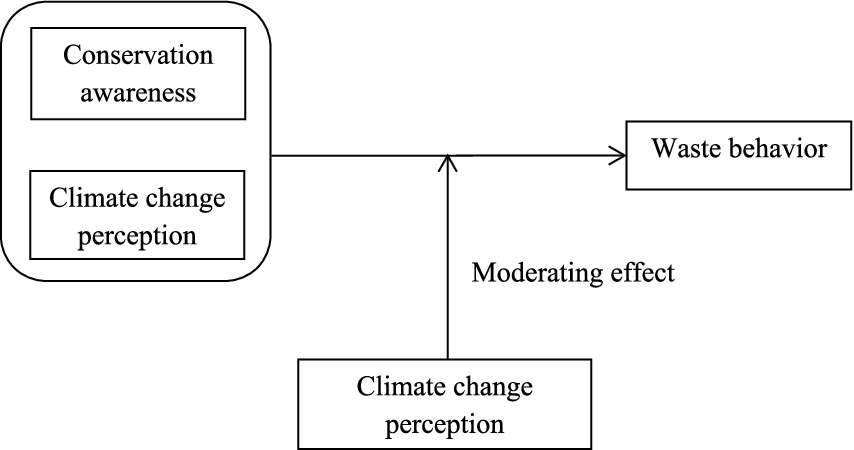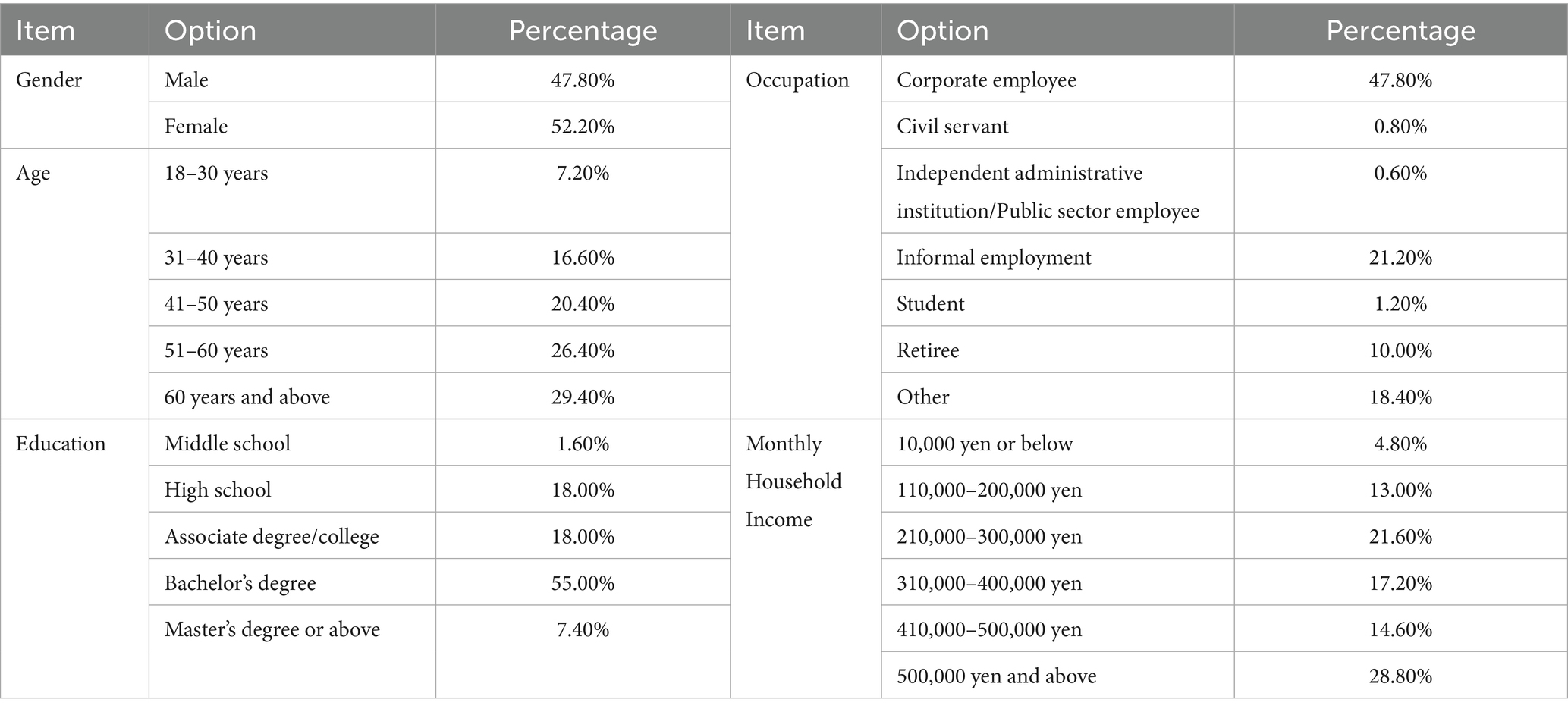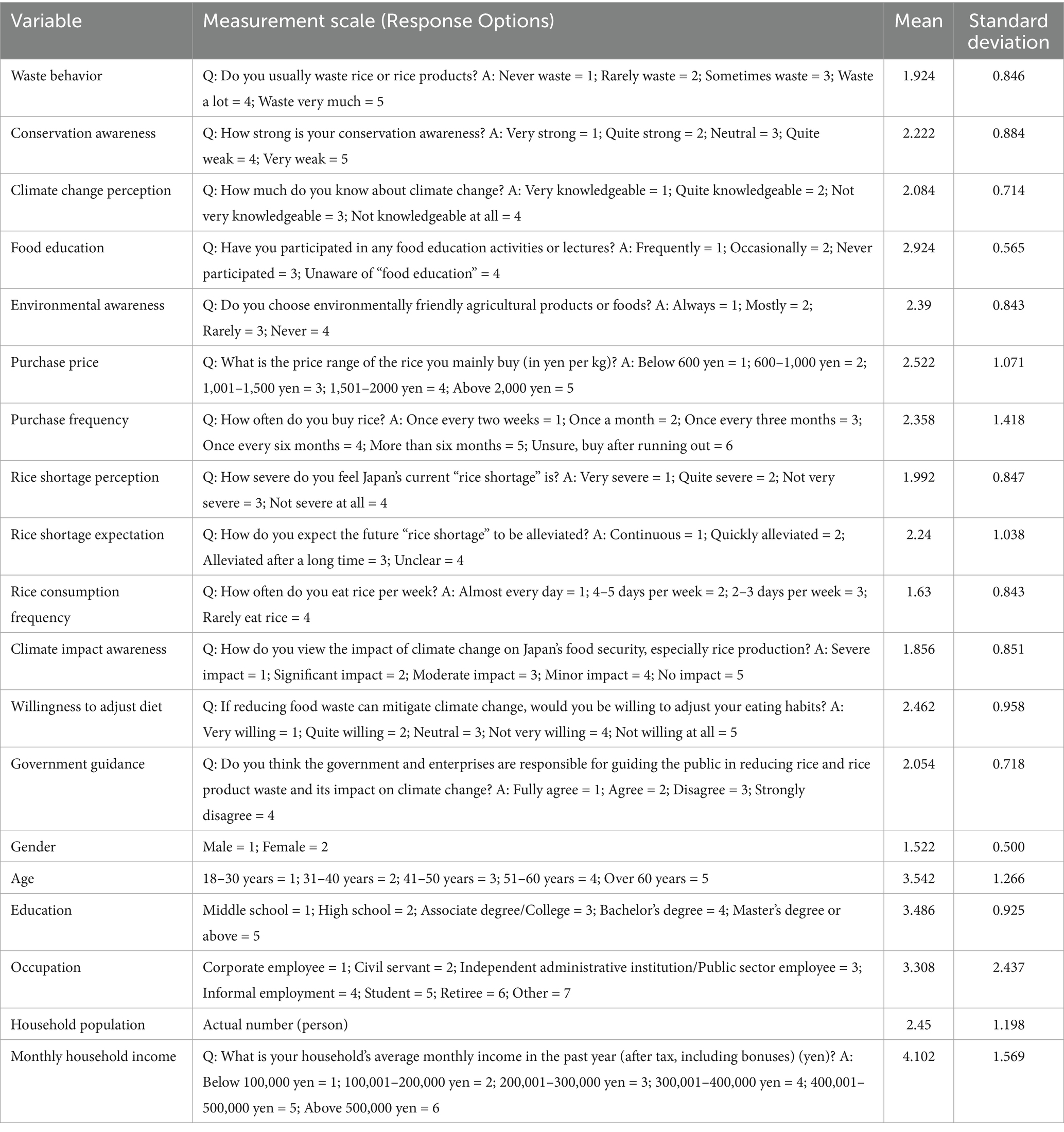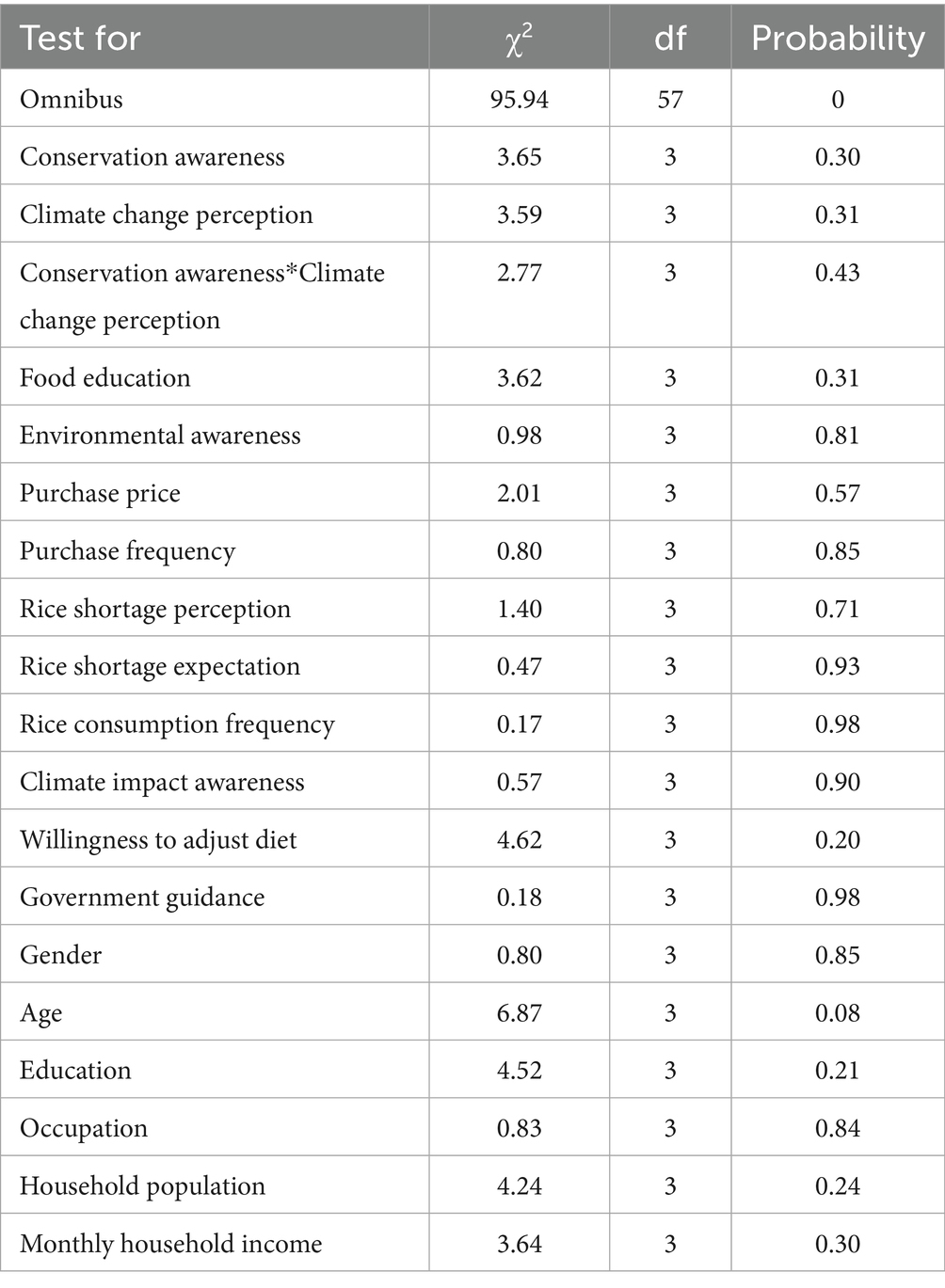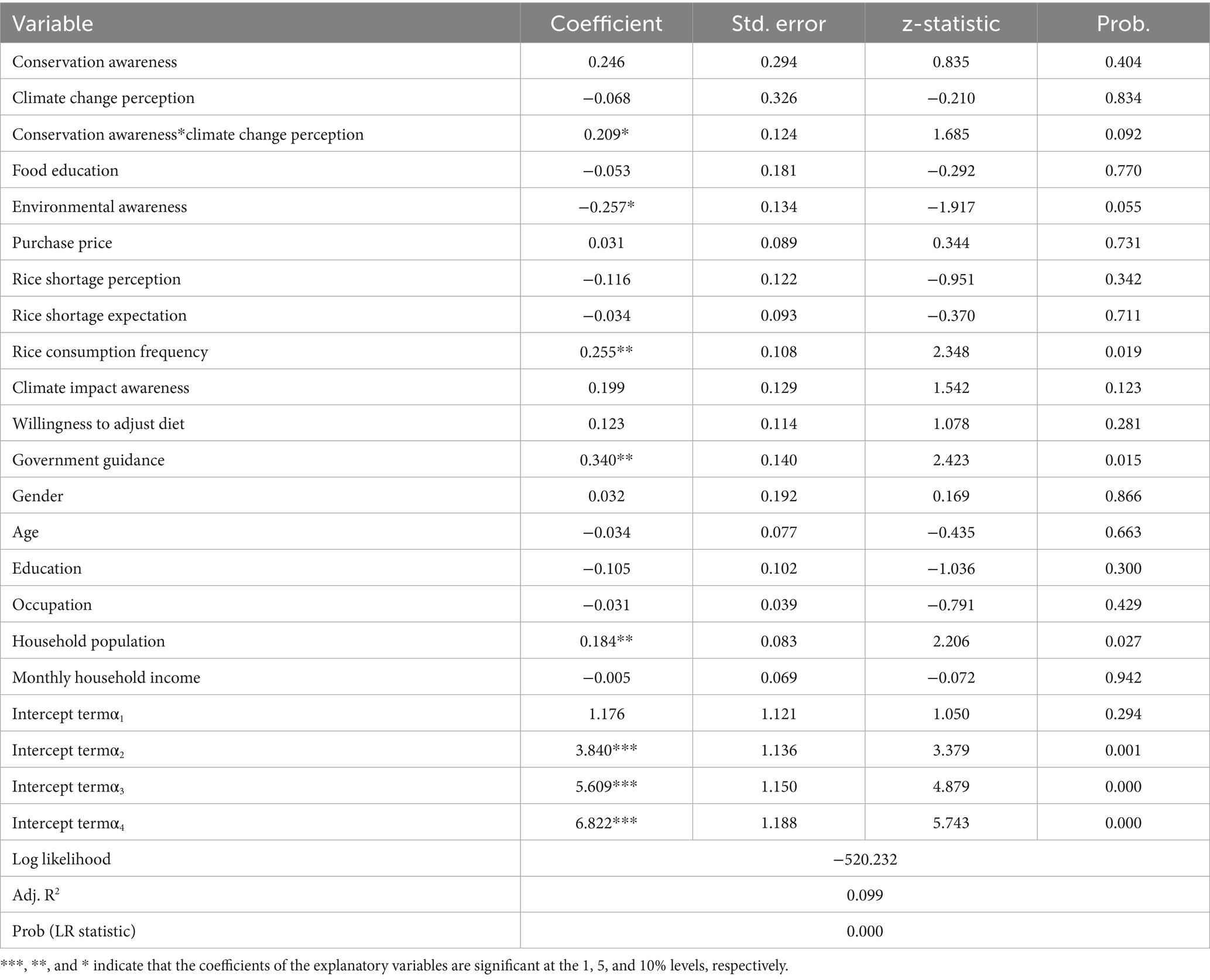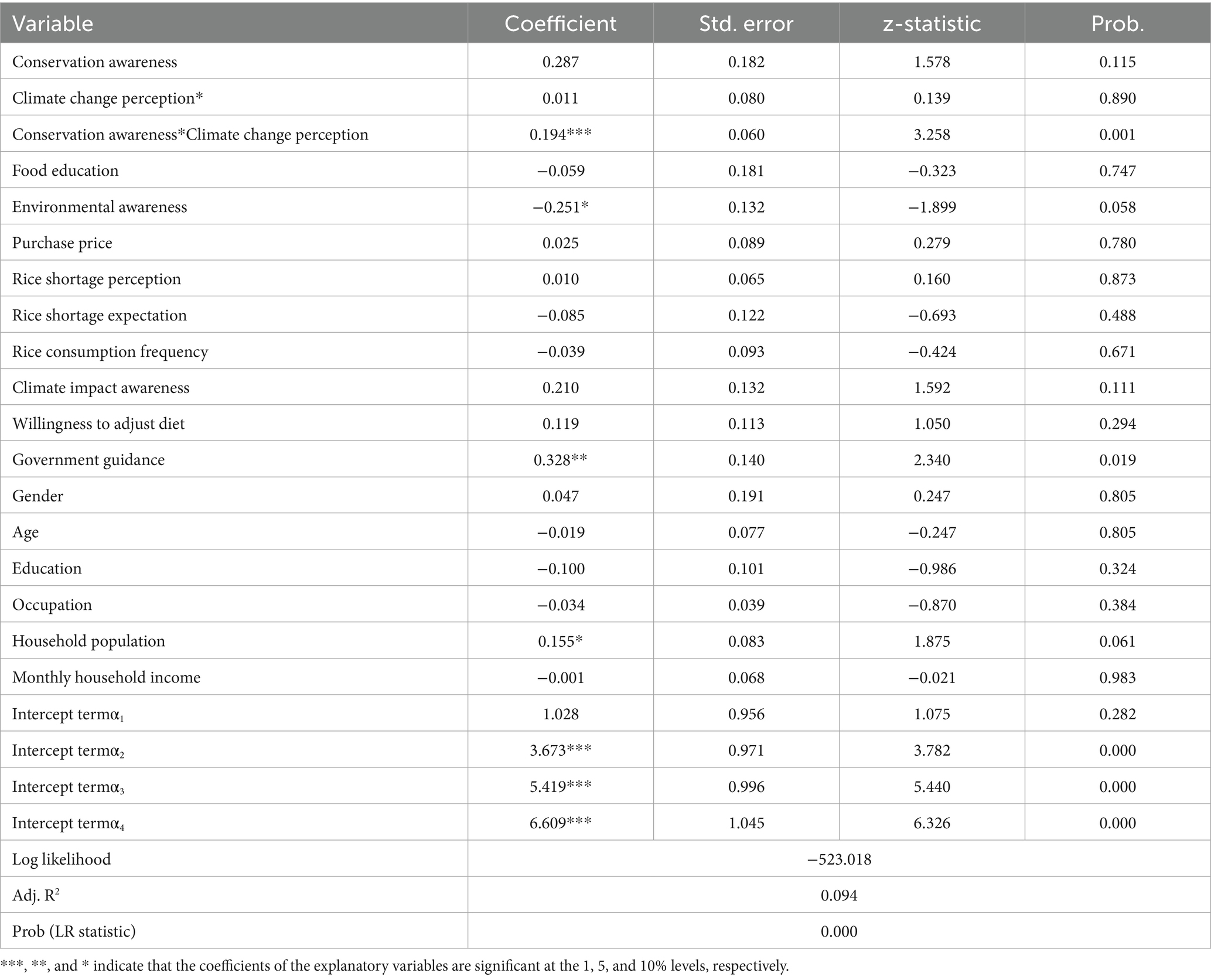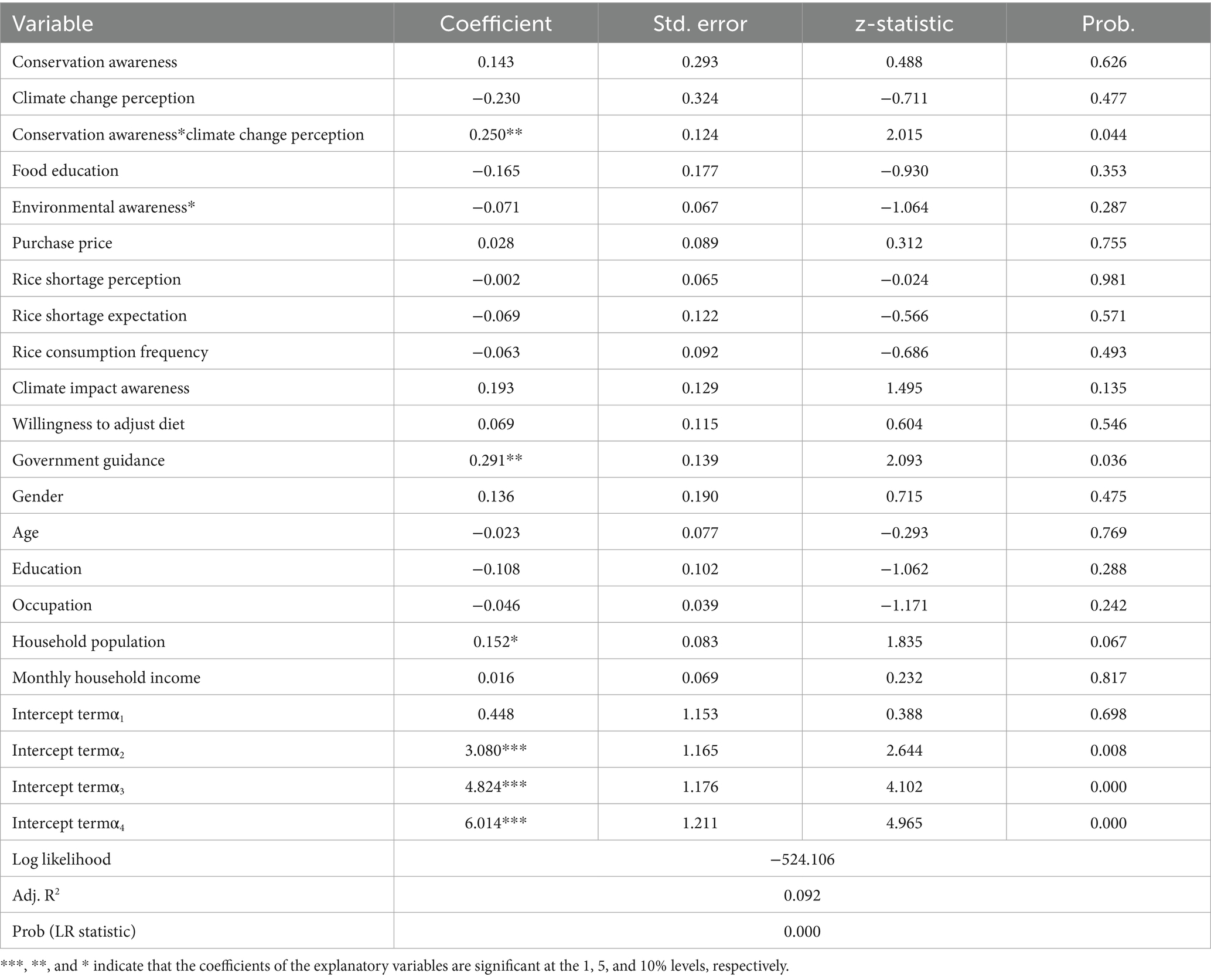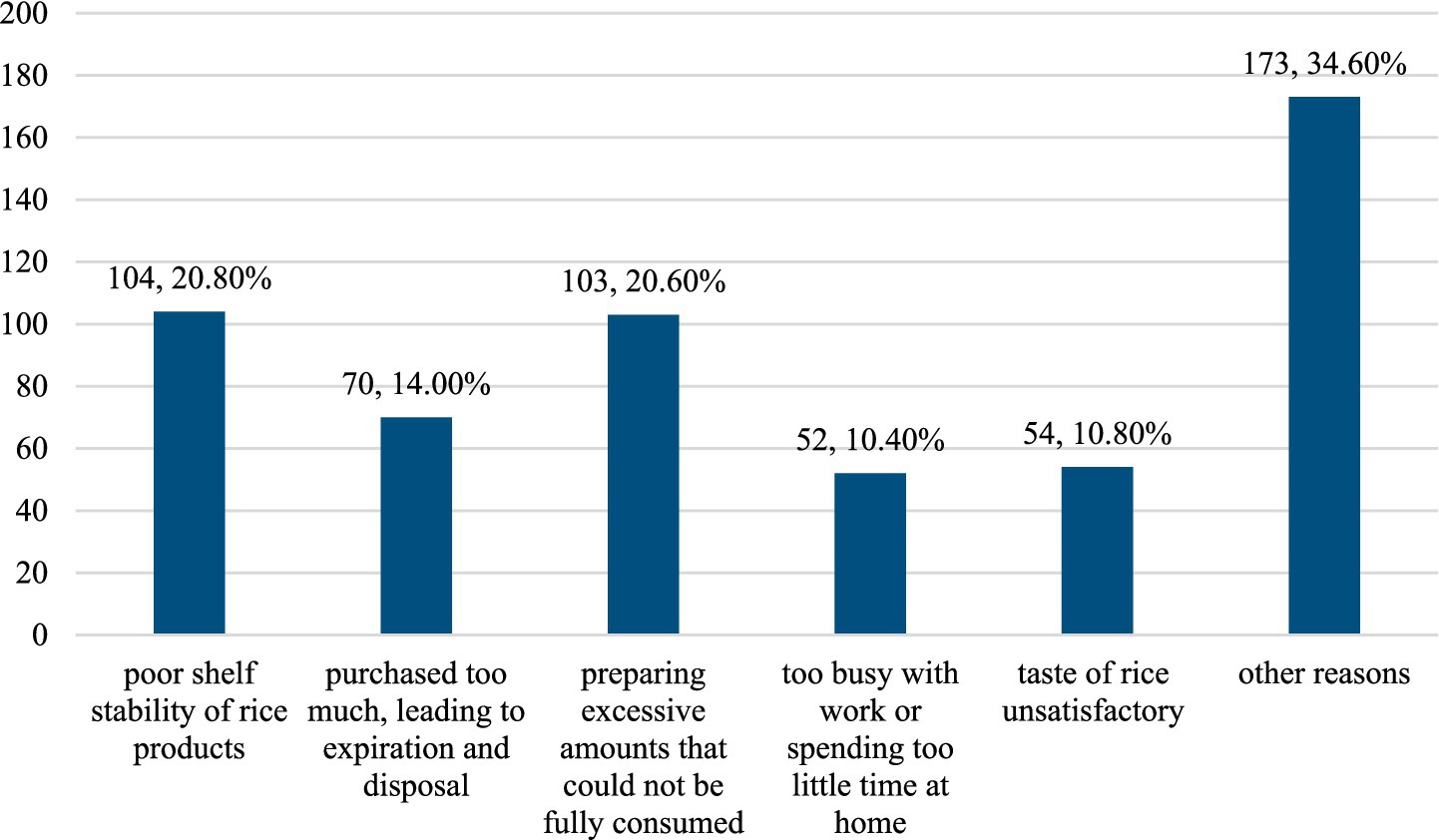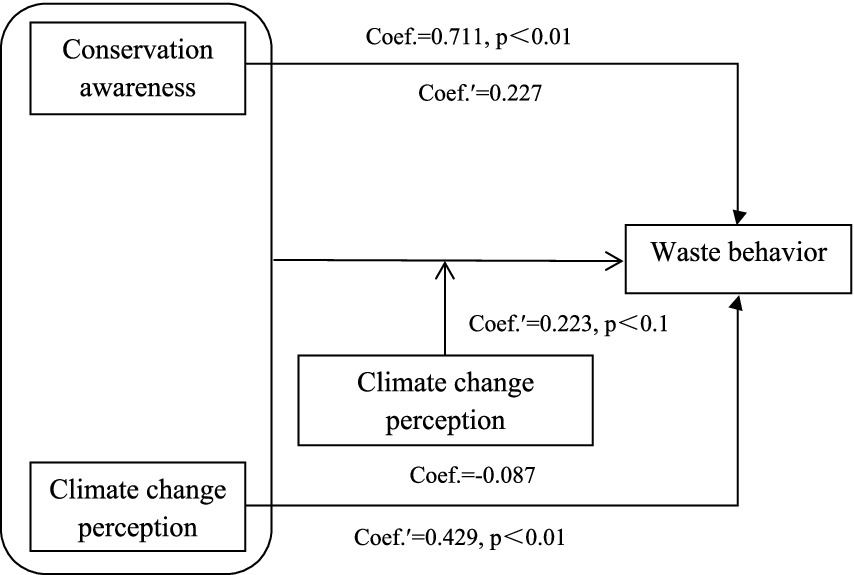- Institute of Agricultural Science and Technology Information, Shanghai Academy of Agricultural Sciences, Shanghai, China
Introduction: Food waste not only affects global food security but also poses challenges to environmental sustainability and socioeconomic development. As one of the major food-consuming countries, Japan faces a significant issue of rice waste, warranting particular attention.
Methods: This study utilizes survey data from 500 Tokyo consumers and applies a multinomial ordered logistic regression model (also known as the proportional odds model, which requires the proportional odds assumption to be satisfied through a parallelism test) to analyze the key factors influencing rice waste behavior.
Results: The results indicate that conservation awareness and climate change perception positively affect waste behavior at the 1% significance level, while their interaction term positively influences waste behavior at the 10% significance level, suggesting that climate change perception moderates the impact of conservation awareness on waste behavior. Government guidance has a positive effect on waste behavior at the 5% significance level, whereas environmental awareness negatively affects waste behavior at the 10% significance level. However, factors such as food education, price range, purchase frequency, perception and expectation of rice shortages, willingness to adjust diet, gender, age, education level, occupation, and household monthly income do not exhibit significant effects. Additionally, the study finds that households with more members tend to waste more rice, while consumers with a stronger awareness of climate change impacts are likelier to reduce waste.
Discussion: These findings provide valuable policy insights for food waste management in Japan and other developed countries. Governments can promote a culture of conservation, enhance public awareness of climate change, and improve food security policies to foster more sustainable food consumption patterns.
1 Introduction
The issue of food waste not only affects global food security but also poses significant challenges to environmental sustainability and socioeconomic development. As one of the world’s major food-consuming countries, Japan has long relied heavily on food imports while facing multiple influencing factors such as population aging, changing consumption habits, and climate change. Consequently, food waste has increasingly attracted attention (Bloom et al., 2011; Thornton et al., 2014; Liu et al., 2016). According to statistics from the Japanese Ministry of Agriculture, Forestry and Fisheries, rice cultivation maintains a high domestic production rate, consistently ranging between 59 and 60% from 2015 to 2023, with a steady year-on-year increase (Source: Japanese Ministry of Agriculture, Forestry and Fisheries). This indicates that rice remains the dominant staple in Japan’s food production system, representing a highly notable trend. However, at the consumption end, the wastage rate is the highest throughout the rice supply chain, resulting in significant levels of loss (Munesue and Masui, 2019). Rice is a very strong Japanese culture that cannot be replaced by other foods such as corn or wheat. However, behind this strong tradition there is a fact that cannot be hidden, that waste from food waste in the form of rice has a fairly high percentage. Against this backdrop, rice, as a central component of Japanese dietary culture, is influenced by complex factors such as national traditions and cultural beliefs (Maraseni et al., 2018).
Given these influences, understanding rice waste and its contributing factors is crucial for providing policy recommendations and practical intervention strategies. Therefore, this study attempts to clarify the research question of what kind of relationship exists between rice consumers’ wasting behavior and their conservation awareness, as well as their perception of climate change.
This study employs a Multinomial Ordered Logistic Regression Model to systematically analyze the key factors influencing rice waste behavior among consumers in Tokyo using survey data. The research focuses on examining the impact of conservation awareness and climate change perception on consumer waste behavior, while also considering factors such as food education and environmental awareness. A substantial body of research has extensively explored the issue of food waste (Oishi, 2019; Billore et al., 2021; Xue et al., 2021; Wang et al., 2022; Wu and Teng, 2023; Li et al., 2024). In particular, studies on rice waste have highlighted its significant contribution to overall grain waste. For instance, Ozturk et al. (2021) Reported that rice accounts for more than 50% of grain waste in Asia, prompting the Japanese government to legalize the Food Recycling Law to reduce waste and convert food scraps into fertilizers and biofuels. Additionally, experimental research on acetic acid generation from food waste has used a mixture of rice, noodles, vegetables, and meat in a 5:2:2:1 volume ratio, with rice waste constituting 50% of total food waste (Wang et al., 2022). These findings underscore the substantial proportion of grain waste within overall food waste (Coudard et al., 2021; Kaman et al., 2024). Moreover, rice is recognized as one of the most wasted foods (Jamaludin et al., 2022), and serves as a fundamental element of Japanese culinary culture (Sirola et al., 2019). Therefore, understanding the factors influencing rice waste is particularly crucial.
Research on food waste has primarily employed qualitative analysis (Zamri et al., 2020; Christine et al., 2021; Shurson et al., 2023) and quantitative analysis (Izumi et al., 2020; Nomura and Feuer, 2021). If food waste is not managed correctly, it can have detrimental effects on the environment and public health. Consequently, scholars have proposed various approaches to repurpose food waste based on public perceptions and recommendations. For instance, some studies suggest using Hermetia illucens (black soldier fly) larvae to efficiently decompose food waste (Kim et al., 2021), while others advocate for implementing effective waste reduction strategies across different stages of the food supply chain, from production to consumption, based on public input (Rachman and Septiana, 2020). Chai et al. (2024) applied structural equation modeling to examine the positive effects of moral constraints (attitudes) and government interventions on urban residents’ willingness and behavior regarding food conservation in China. Additionally, food waste contributes to climate change; research indicates that food waste in the United Kingdom generates approximately 27 million tons of CO₂-equivalent greenhouse gas emissions annually, with grains accounting for 31% of the total (Jeswani et al., 2021). Thus, food waste exacerbates climate change. Overall, qualitative research on food waste tends to focus on waste management and disposal strategies, while quantitative studies emphasize identifying influencing factors and exploring ways to mitigate food waste by modifying these determinants.
A body of research has also focused on policy proposal and implementation. In response to the severe rice wastage, Japan has introduced policies and measures such as the Basic Law on Food Education (Shokuiku Kihonhō), the Clean Plate Campaign, and the incorporation of rice waste reduction into its national food security strategy (Marra and Cwiertka, 2013). Despite the soaring rice prices in recent years, significant wastage of rice balls and boxed meals (bentō) persists, a phenomenon that has raised social concerns. Furthermore, the incineration of carbohydrate-rich food waste generates substantial carbon dioxide emissions, contributing significantly to global warming (The Japan Agricultural News, 2025). However, for a long period prior, Japan’s rice consumption had been declining steadily due to dietary diversification and population decrease. The panic buying of rice in 2024 represented only a short-term surge in demand, underscoring the increasingly complex factors influencing rice consumption behavior. To mitigate waste at the end of the consumption, the government has promoted “leftover rice reuse recipes” (e.g., for rice balls and porridge) through the Consumer Affairs Agency’s official platform “Consumer Agency’s Kitchen” to reduce household waste (Sugita, 2020). In Reiwa 7 (2025), Minister of Agriculture, Forestry and Fisheries Shinjiro Koizumi delivered a address advocating for the reduction of food waste, particularly rice-based products, and called on the public to minimize waste throughout the supply chain.
As one of the most densely populated and economically developed cities in Japan, Tokyo plays an important role in shaping the national food security landscape. Consumer food waste behavior in Tokyo significantly impacts Japan’s overall food security and reflects consumption patterns and awareness of resource conservation among urban residents. Therefore, revealing the tendencies and determinants of rice waste behavior among consumers in Tokyo will provide a scientific basis for formulating food waste reduction policies in Japan and other developed countries.
2 Theoretical analysis and hypothesis
2.1 The impact of conservation awareness on rice waste behavior
Food waste is commonly examined through theories such as the Theory of Planned Behavior (TPB), Social Norm Theory, and Behavioral Economics. Conservation awareness refers to an individual’s cautious attitude and behavioral tendencies regarding resource utilization in daily life. According to the TPB, behavioral intention plays a crucial role in individual decision-making, with attitude, subjective norms, and perceived behavioral control collectively influencing actual consumer behavior (Ajzen, 1991; Ibrahim and Arshad, 2017; Hasan and Suciarto, 2020). As a positive attitude, conservation awareness may encourage consumers to reduce food waste. Thus, consumers with a higher level of conservation awareness are more motivated to minimize food waste (Mohamed Sadom et al., 2022; Stancu and Lähteenmäki, 2022). Research has shown that personal responsibility, including behavior and awareness, plays a dominant role in reducing food waste (Parizeau et al., 2015). Moreover, individuals with strong conservation awareness are more likely to plan food purchases and storage rationally, thereby reducing waste (Stancu et al., 2016). Empirical studies indicate that social norms positively influence personal norms, attitudes and intentions toward food-waste reduction, as well as individuals’ conservation awareness (Al Mamun et al., 2024). HOU et al. (2022) employed an integrated approach combining questionnaire surveys and neuroscientific experiments (electroencephalography, EEG) to reveal a complex and non-linear relationship between conservation awareness and food waste behavior. Radde et al. (2024) indicate that climate change cognition can indirectly reduce food waste by influencing key behavioral drivers—namely, attitudes, sense of responsibility, subjective norms, and perceived behavioral control. Lu et al. (2025) found that enforcement awareness of the “Anti–Food Waste Law” significantly reduced consumers’ rice waste in online food delivery. This effect was fully mediated by enhanced “food safety literacy,” with the most pronounced impact observed among consumers over 30 years of age, those holding university degrees, and suburban residents. Saro et al. (2025) report a significant positive correlation among environmental awareness, attitudes, and behaviors in high school students, with the strongest linkage between awareness and behavior. Nonetheless, overall ecological behaviors remained at a mid-level, indicating a persistent gap between cognition and action. Based on the above analysis, this study proposes the following hypothesis:
H1: Conservation awareness has a significant positive impact on rice waste behavior.
2.2 The impact of climate change perception on rice waste behavior
Climate change perception refers to an individual’s understanding and concern. According to the Norm Activation Theory (NAT), when individuals become aware of their behavior’s impact on the environment, they are more likely to engage in responsible actions (Schwartz, 1977). Although the public has become increasingly aware of the risks posed by climate change, the food industry still accounts for about one-third of global greenhouse gas emissions (Aschemann-Witzel et al., 2015). Consumers with higher climate change perception may be more concerned about the negative environmental impacts of food waste, such as greenhouse gas emissions, and are, therefore, more likely to reduce waste (Graham-Rowe et al., 2015; Reisch et al., 2021). Nielsen et al. (2024) indicate that cognitive interventions—such as information framing, social norm nudging, and priming techniques—can effectively bridge the intention–behavior gap, thereby facilitating both emission reduction and adaptation actions. To translate “climate change awareness” into action, it is necessary to simultaneously strengthen the pathways from cognition to attitudes, from subjective norms to personal norms, and through self-efficacy or resource availability, ensuring these align with the value–belief–norm chain (Savari and Khaleghi, 2025). Because adaptive behaviors are driven by rationality and perceived controllability, whereas mitigation actions depend more on moral motivation and social norms, strategies should be designed with differentiation (Thamsuwan, 2024). Based on the above analysis, this study proposes the following hypothesis:
H2: Climate change perception has a significant positive impact on rice waste behavior.
2.3 The moderating effect of climate change perception
There may be a moderating effect between conservation awareness and climate change perception. According to the Cognitive-Affective Behavior Theory, an individual’s behavior is influenced not only by a single cognitive factor but also by the interaction of multiple cognitive factors (Eagly, 1993). For example, consumers with strong conservation awareness who recognize environmental and ethical issues related to food waste, such as climate change, are likely to reduce food waste as much as possible (Flanagan and Priyadarshini, 2021). Strong conservation awareness and climate change perception are also reflected in the habit of reusing leftover food, which can directly reduce food waste (Stancu et al., 2016). Climate change cognition—or related perceptions—frequently influences actual behavior by amplifying or attenuating the strength of the value/risk perception → attitude/intention → behavior pathway (Riva et al., 2022; Shukla et al., 2022; Latif et al., 2024). Tran and Chen (2022), in their study focusing on coffee farmers, found that self-efficacy plays a crucial moderating role between climate risk perception and adaptation behavior: high self-efficacy strengthens the positive influence of risk perception on behavior, whereas low self-efficacy may weaken this pathway and even lead to avoidance behavior. When individuals possess strong conservation awareness and climate change perception, they will likely adopt behaviors that actively reduce waste. Based on the above analysis, this study proposes the following hypothesis:
H3: Climate change perception moderates the impact of conservation awareness on rice waste behavior.
2.4 The impact of other control variables
Studies have shown that consumers’ socioeconomic characteristics (such as gender, age, occupation, education, and income) and the price of products significantly influence the frequency of purchasing local rice (Sedem Ehiakpor et al., 2017; Wahyudi et al., 2019). Among these, consumers at both ends of the income spectrum (i.e., high-income and low-income consumers) are more likely to engage in wasteful behaviors, revealing a polarized relationship between income levels and household food waste frequency (Setti et al., 2016). Furthermore, consumers who prioritize price are found to exhibit lower levels of food waste compared to those focused solely on price discounts (Aschemann-Witzel et al., 2017). Government guidance refers to public behavioral changes shaped through policy promotion and intervention measures. According to Social Norms Theory, government policies and guidance can shape social norms, thereby influencing individual behavior (Cialdini et al., 1990). Regarding dietary education, research has shown that food waste significantly decreases among students after receiving education on environmental protection, proper dietary attitudes, and the consequences of poor eating habits (Kim et al., 2007). In this study, government guidance and food education may influence consumer behavior intentions, thereby moderating rice waste behavior. Zsóka et al. (2013) Found that environmental awareness is stronger among university students than high school students. In this study, factors such as food education, government guidance, rice prices, household income levels, and purchase frequency may affect how much consumers value rice, thus determining their waste behaviors.
Based on the above theoretical analysis, the theoretical framework for this study is shown in Figure 1.
3 Data source and methodology
3.1 Data source and sample description
The questionnaire for this study was designed based on the research approach of Chai et al. (2024), the 2023 Japanese residents’ food education survey (MAFF, 2023), and Japan’s climatic characteristics. It consists of four sections. The first section covers basic information, including gender, age, education level, occupation, household size, and monthly household income. The second section focuses on rice consumption, including purchasing price, frequency, quantity, purchasing channels, essential factors (price, brand, taste, safety, origin, nutrition, and packaging), perceptions of rice shortages, and expectations. The third section addresses food waste awareness, including the necessity of saving, conversation awareness, food education, environmental awareness, waste behavior, attitudes towards waste, and rice consumption frequency. The fourth section focuses on climate change and rice waste awareness, including climate change perception, experiences, understanding of climate impacts, willingness to adjust diets, and government guidance. The survey was conducted by randomly distributing 1,148 questionnaires via the Toluna platform, with 600 responses finally collected. During the distribution process, targeted delivery was implemented based on background member attribute tags, and users who had participated in surveys on similar topics within the past 3 months were excluded. Such users, belonging to a high-frequency participation group, often respond repeatedly motivated by survey rewards and may pose a risk of being “professional respondents.” To ensure data quality, such individuals were excluded in accordance with the recovery protocol.
During the data cleaning phase, the following criteria were applied to filter the collected responses: (1) Responses with abnormally short completion times were excluded; (2) Responses containing contradictory personal information, such as mismatched age and occupation (e.g., an 18-year-old selecting “retired”), were removed; (3) Responses with clearly perfunctory or nonsensical answers to open-ended questions were discarded. The questionnaire was pre-tested by Toluna in mid-December 2024, followed by an online survey, which collected 500 valid responses by the end of the month.
Table 1 presents the essential characteristics of the sample. Regarding gender, 47.80% of respondents are male, while 52.20% are female, with a relatively balanced distribution. Most respondents are middle-aged and elderly, with 76.20% of the sample over 40 years old, which aligns with Japan’s aging trend. Regarding education level, 55.00% of respondents have a bachelor’s degree. In terms of occupation, 47.80% of respondents are corporate employees. Regarding monthly household income, the most prominent groups are those between 210,000–300,000 yen and those above 500,000 yen, accounting for 21.60 and 28.80%, respectively. Overall, the sample is well-distributed, which helps reduce potential estimation errors in the model.
With respect to demographic characteristics, a noticeable imbalance was observed in the sample composition. Younger adults aged 18–30 accounted for only 7.2% of the sample, whereas the middle-aged and elderly population (aged 51 and above) represented a considerably high proportion of 55.8% (26.4% for 51–60 and 29.4% for over 60). In comparison, the elderly population (aged 65 and above) in Tokyo constitutes approximately 34.6% (2021 data), while the national proportion of people aged 65 and above is around 29.3%. Additionally, the sample was slightly skewed toward female respondents (52.2% female vs. 47.8% male). Overall, the sample exhibits a clear overrepresentation of middle-aged, older, and female participants. This bias is likely attributable to the online convenience sampling method, which may have attracted a higher proportion of older adults active in online environments.
Table 2 presents the descriptive statistics of all scale variables using the Mean (M) and Standard Deviation (SD). The mean reflects the central tendency of responses, indicating the average behavioral patterns or cognitive levels, while the standard deviation quantifies the variability in responses, reflecting the degree of consensus (low SD) or divergence (high SD) among participants. A mean value of 1.522 suggests a slightly higher proportion of female participants compared to males, though the gender distribution remains relatively balanced. A standard deviation of 0.500 indicates that the data distribution conforms to expectations, with no outliers detected, demonstrating good data quality in this regard. According to the statistics, consumers’ waste behavior tends to lean toward minimizing waste, with a stronger tendency for conservation awareness. Climate change perception is relatively evenly distributed. Food education experience leans more toward those not participating in food education programs. The mean and standard deviation of environmental awareness indicate that consumers are more likely not to choose environmentally friendly agricultural products or foods. Most consumers purchase rice for 1,500 yen per kilogram or below. The frequency of purchases is relatively high. Perceptions of rice shortages lean toward serious concerns, while expectations of rice shortages tend to predict a long period before relief. The frequency of rice consumption is more likely to be four to five times a week or more. Climate impact awareness indicates the severe impacts of climate change on rice production. The willingness to adjust diets leans toward a willingness to adapt. Government guidance is distributed relatively evenly.
Specifically, for wasting behavior, the percentages of responses for “never,” “rarely,” “sometimes,” “often,” and “very often” were 32.00, 49.80, 13.60, 3.00, and 1.60%, respectively. For conservation awareness, the percentages for “very strong,” “relatively strong,” “moderate,” “relatively weak,” and “very weak” were 23.20, 37.00, 35.80, 2.40, and 1.60%, respectively. For climate change perception, the percentages for “very familiar,” “relatively familiar,” “not very familiar,” and “completely unfamiliar” were 17.40, 61.00, 17.40, and 4.20%, respectively.
3.2 Model construction and variable specification
If the parallelism test is satisfied, this study employs the Multinomial Ordered Logistic Regression Model to analyze how various influencing factors affect consumer preferences for rice consumption behavior. Based on the study by Arı et al. (2014), the model is specified as Equation (1):
Equation (1) is equivalent to Equation (2):
The model incorporating climate change perception as a moderating variable is shown in Equation (3):
Where, is the ordinal dependent variable representing the level of consumer food waste behavior; is the total number of waste behavior levels; is the matrix of independent variables; represents the interaction term between conversation awareness and climate change perception ; and are the regression coefficients; and denotes the category-specific intercept parameters. This study employs the maximum likelihood estimation (MLE) method for parameter estimation.
Various complex factors influence individual food waste behavior. In this study, food waste behavior is selected as the dependent variable and classified according to waste levels, such as: “never waste” = 1, “rarely waste” = 2, “moderately waste” = 3, “often waste” = 4, and “waste a lot” = 5, which aligns with the characteristics of an ordinal variable. The key independent variables are conversation awareness and climate change perception. Other independent variables include food education experience, environmental awareness, purchasing habits (e.g., purchase price and purchase frequency), purchasing experience (e.g., rice shortage perception and rice shortage expectation), willingness to adjust dietary habits, and external factors (e.g., government guidance).
Purchasing experience includes perceptions of rice shortages, which is particularly relevant given that Japan experienced extreme heat in 2024. This led to a significant decline in rice production due to a high occurrence of immature white grains, resulting in a severe rice shortage. Therefore, consumers’ perceptions and expectations of the rice shortage are also included as independent variables to examine their potential impact on rice waste behavior.
Control variables include age, gender, education level, occupation, household size, and monthly household income.
4 Results and discussion
4.1 Parallelism test
The parallelism test is used to examine whether the multinomial ordered logistic regression model satisfies the proportional odds assumption, which states that the regression coefficients of independent variables remain the same across all response categories (Arı et al., 2014). If this assumption holds, the proportional odds model (POM) can be applied; otherwise, alternative models such as the partial proportional odds model or the generalized ordered logistic regression model should be considered (Williams, 2006). The parallelism test results in Table 3 show that the test results for independent and control variables are more significant than 0.05. The test results indicate that although the Omnibus test of the overall model was statistically significant, suggesting a general violation of the proportional odds assumption at the global level, the separate tests for each independent variable yielded p-values well above conventional significance levels. This implies that, despite a potential overall deviation, the coefficients for each specific independent variable—such as conservation awareness, climate change perception, their interaction term, and all control variables—did not exhibit statistically significant differences across response categories, thereby satisfying the parallel lines assumption. Therefore, the assumption of parallel lines holds, and the multinomial ordered logistic regression model can be applied to investigate the factors influencing rice waste behavior.
4.2 Analysis of factors influencing rice waste behavior
The variance inflation factor (VIF) for all variables is well below 10, and the tolerance values are greater than 0.4, indicating that multicollinearity is absent among the variables. Although the generalized ordered logit/partial proportional odds model imposes fewer restrictions, it is inherently problematic or, at the very least, not the optimal choice (Williams, 2016). Following the study by Luo et al. (1998), this study adopts the proportional odds model of the multinomial ordered logistic regression, which has lower estimation bias, in combination with the stepwise variable addition method to analyze the factors influencing rice consumption behavior in 2024.
The study systematically examined the relationships among variables by constructing four hierarchical regression models. Model 1, serving as the baseline model, initially confirmed the significant positive main effects of conservation awareness and climate change perception on reducing rice waste behavior. Model 2 assessed the influence of variables other than the two core independent variables on wasting behavior. Model 3 incorporated all variables, and the results demonstrated that the net effects of the two core independent variables remained robust, confirming the persistence of their main effects. Finally, Model 4 introduced an interaction term, revealing that climate change perception significantly and positively moderated the relationship between conservation awareness and waste reduction behavior. That is, the stronger an individual’s perception of climate change, the more pronounced the reduction in wasteful behavior driven by conservation awareness. This sequential modeling approach, from simple to complex, progressively validated the main effects and uncovered a key moderating mechanism (Table 4). As shown in Table 4, in both Model 1 and Model 3, conversation awareness has a significant positive effect on rice waste behavior at the 1% significance level. This suggests that stronger conversation awareness leads to lower rice waste behavior. Additionally, climate change perception in Model 1 and Model 3 also exhibits a significant positive effect on reducing rice waste at the 1% level, indicating that greater awareness of climate change corresponds to less rice waste.
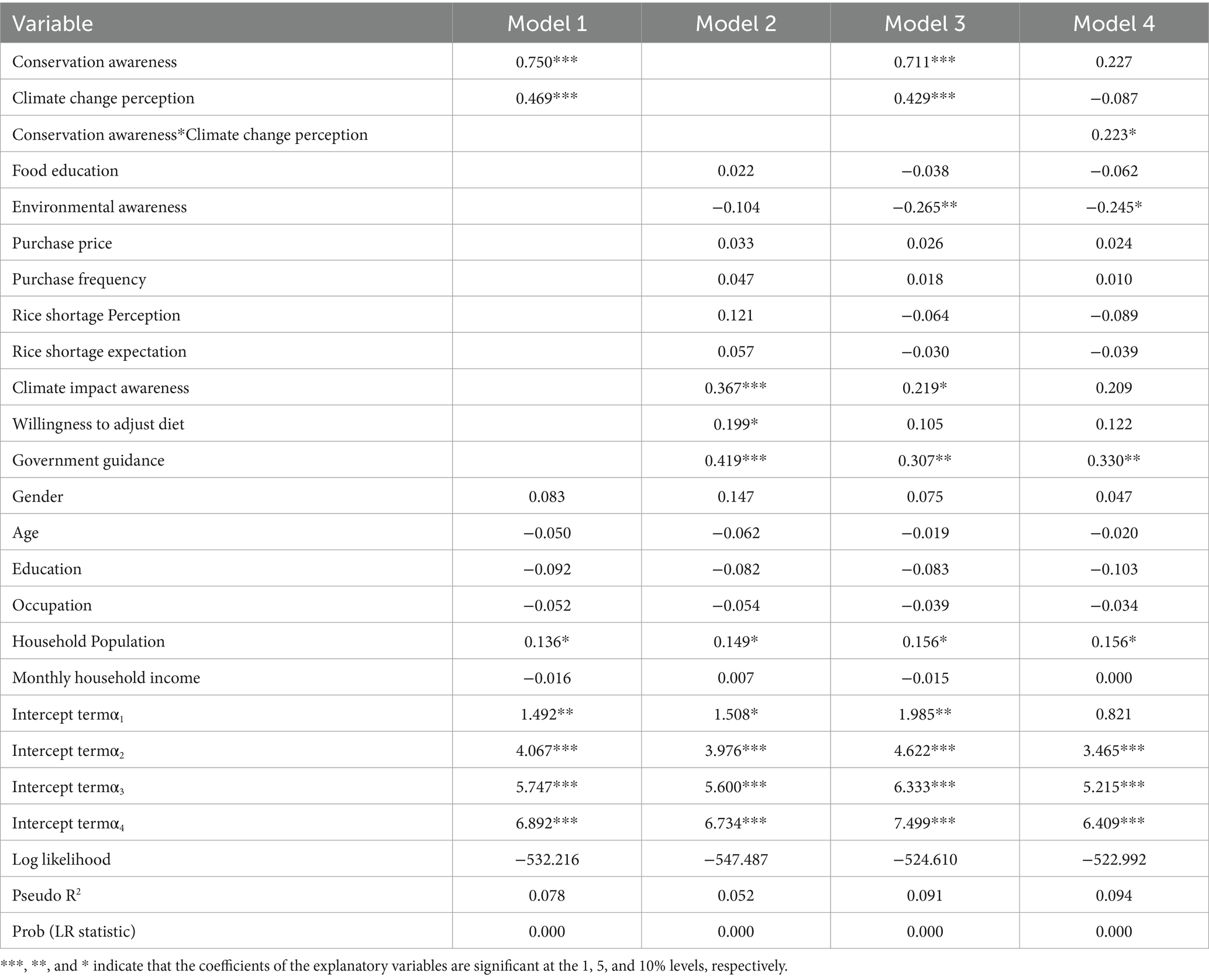
Table 4. The impact of conversation awareness and climate change perception on rice waste behavior and the moderating effect results.
Model 1 includes only the two core independent variables and control variables. Among the control variables, only household size has a significant positive effect on waste behavior (i.e., larger households tend to waste more rice), while the other control variables are insignificant. Model 2 presents regression results for variables excluding the core independent variables. The results indicate that climate impact awareness, willingness to adjust diet, and government guidance significantly and positively influence waste behavior. Specifically, individuals who perceive climate change as a greater threat to rice production are less likely to waste rice; those more willing to adjust their diet to mitigate climate change waste less rice; and those who agree that the government should guide food waste reduction also waste less. However, food education, environmental awareness, purchasing price, purchase frequency, perceived rice shortage, and rice shortage expectations are not significant.
In Model 3, which includes all variables (core independent variables, moderating variables, and control variables), environmental awareness becomes significantly and negatively associated with rice waste behavior. This indicates that individuals who do not choose environmentally friendly agricultural products are also less likely to waste rice. Meanwhile, climate impact awareness and government guidance remain significant in reducing rice waste, but willingness to adjust diet becomes insignificant.
Model 4 extends Model 3 by incorporating the interaction term between conversation awareness and climate change perception to estimate the moderating effect. The results reveal that the interaction term significantly and positively affects rice waste behavior, suggesting that climate change perception strengthens the impact of conversation awareness on reducing waste behavior. Furthermore, the coefficient for conversation awareness drops to 0.227, while the coefficient for climate change perception changes to −0.087 and loses significance, indicating that after including the interaction term and other control variables, the direct effects of conversation awareness and climate change perception weaken.
Examining the pseudo R-squared values from Model 1 to Model 4 (excluding Model 2), we observe a consistent increase as more influencing factors are introduced, suggesting that the inclusion of additional variables improves the model’s explanatory power.
Overall, conversation awareness and climate change perception have significant direct effects on reducing rice waste behavior, and their interaction has a positive moderating effect. Environmental awareness significantly negatively affects rice waste, while government guidance significantly reduces waste. Larger household sizes are associated with more incredible rice waste. However, food education, purchase price, purchase frequency, perceived rice shortage, rice shortage expectations, gender, age, education, occupation, and household income do not have significant effects on rice waste behavior.
Therefore, hypotheses H1, H2, and H3 proposed in Section 2 are supported.
4.3 Robustness test
A robustness test of the model was conducted using the variable substitution method. Based on the previous analysis, the frequency of rice consumption passed the parallelism test and exhibited no multicollinearity, making it a suitable substitute for the purchase frequency variable. Therefore, we replaced the purchase frequency with the rice consumption frequency to perform the robustness check, with the results presented in Table 5. The core independent variables, such as conservation awareness and climate change perception, still showed a significant positive effect on wasting behavior. After replacing the purchase frequency with the rice consumption frequency, the results differed in that rice consumption frequency significantly and positively influenced wasting behavior, meaning that higher rice consumption frequency was associated with less rice waste. The significance of the remaining variables did not change. The overall model fit indices, such as Log-likelihood, further support the stability of the aforementioned relationships. Although the main effects were not statistically significant, the identified interaction effects remained consistent across different model specifications, underscoring the reliability of the research conclusions. Overall, the model results after variable substitution showed improved fitness and minimal changes in variable significance compared to Model 4, indicating that Model 4 is robust (Table 6).
To test the robustness of the model, the variable representing climate change perception was replaced with the variable indicating personally experienced climate conditions. The results demonstrate that climate change perception remains a positive moderator in the effect of conservation awareness on wasting behavior. Furthermore, the significance of environmental awareness, government regulation, and household size on wasting behavior remained unchanged. Therefore, we conclude that the multivariate ordered logistic model is robust.
We conducted a robustness test by replacing the variable of environmental awareness with the variable indicating “which type of environmentally friendly agricultural products you usually choose.” The results show that the positive moderating effect of climate change perception on the relationship between conservation awareness and wasting behavior remains unchanged. Furthermore, although the substitute variable for environmental awareness was not statistically significant after being incorporated into the model, it exerted a negative influence on wasting behavior consistent with that of the original environmental awareness variable—that is, less frequent choice of environmentally friendly agricultural products was associated with higher levels of waste. Finally, the significance of government regulation and household size remained unaffected. Thus, these results also demonstrate the robustness of the multivariate ordered logistic model (Table 7).
When asked about “reasons for wasting rice and rice-based products,” 173 respondents (34.60%) reported “other reasons.” Among these, our analysis shows that 165 respondents stated they “never waste rice or rice-based products,” while the remaining 8 cited reasons such as children wasting rice, insects found in rice, rice being burned during cooking, and sugar control dietary requirements.
Additionally, 104 respondents (20.80%) attributed wastage to the poor shelf stability of rice products, which are prone to spoilage; 103 respondents (20.60%) reported preparing excessive amounts that could not be fully consumed; 70 respondents (14.00%) indicated that they purchased too much, leading to expiration and disposal; 54 respondents (10.80%) considered the taste of rice unsatisfactory and thus disliked consuming it; and 52 respondents (10.40%) mentioned being too busy with work or spending too little time at home, resulting in forgetfulness about consumption (Figure 2).
The analysis reveals that approximately one-third of the respondents claimed never to waste rice or rice-based products, while two-thirds reported various reasons leading to wastage. Such wastage not only threatens food security but also exacerbates climate change. Therefore, reducing staple food waste should be a major focus for societal efforts.
4.4 Discussion
This study, based on survey data from 500 consumers in Tokyo, employs the multinomial ordered logistic regression proportional odds model to examine the impact of conservation awareness and climate change perception on consumer waste behavior. The findings indicate that both conservation awareness and climate change perception have significant positive effects on reducing rice waste. Additionally, the interaction between conservation awareness and climate change perception also significantly influences food waste behavior, suggesting that while consumers’ conservation awareness reduces rice waste, climate change perception enhances the positive effect of conservation awareness on rice waste. The effect of food education on rice waste behavior was found to be insignificant. The impact of purchase frequency on rice waste behavior was not significant in different models, possibly due to the mediating role of consumers’ storage habits and purchasing strategies in waste reduction. Interestingly, environmental awareness had a negative impact on waste behavior in some models, indicating that individuals with lower environmental awareness tend to waste less. This may be due to differing interpretations of the “environmental” concept among individuals, as some consumers might focus more on reducing overall waste rather than choosing eco-friendly products. This result could also be associated with the higher prices of eco-friendly agricultural products or cognitive biases towards them, suggesting that the relationship between environmental awareness and food waste behavior may be moderated by other factors. Furthermore, government guidance has a positive effect on reducing rice waste, highlighting the government’s critical role in food security and sustainable consumption. Among the control variables, household size was positively correlated with rice waste, meaning that consumers with larger households tend to waste more. This may be related to the increased difficulty in meal planning and storage limitations associated with larger family sizes, suggesting the importance of household-level interventions (such as proper meal planning and improving storage conditions) in reducing waste. The remaining control variables did not show significant results.
In contrast to this study, Quested et al. (2013) found that the impact of conservation awareness on food waste may be moderated by household size and economic conditions. For instance, in low-income households, conservation awareness might directly translate into reduced waste behavior, whereas in high-income households, the impact of conservation awareness might be weaker. This difference suggests that future research should further explore the moderating role of household economic status in the relationship between conservation awareness and food waste. Parizeau et al. (2015) found that food education has a significant impact on reducing food waste, particularly in school and community-level interventions. However, in this study, food education did not significantly affect waste behavior, possibly due to the specificity of the Tokyo sample. For example, Tokyo consumers generally have higher educational levels, which might have weakened the impact of food education as a variable.
Since the respondents in this study were residents of Tokyo, who generally have higher incomes, and due to the limitation of a 500-sample size, the analysis of income heterogeneity is also constrained. Therefore, future research could expand the geographical scope beyond high-income metropolitan areas like Tokyo to include underdeveloped regions and increase the sample size to explore further the role of these variables in the different areas and cultural contexts.
5 Conclusion
This study investigates the impact of conservation awareness, climate change perception, and their interaction on rice waste behavior among consumers in Tokyo, Japan. Through the analysis using a multinomial ordered logistic regression model, the key findings are as follows:
The core findings of this study are illustrated in Figure 3. “Coef.” denotes the coefficient and its significance for each variable before the inclusion of the moderator variable, while “Coef.′” refers to the coefficient and its significance after the moderator variable is added. The results indicate that both conservation awareness and climate change perception independently and effectively reduce food waste. Moreover, there is a synergistic enhancement effect: the higher the climate change perception, the stronger the influence of conservation awareness in driving behavioral change.
Conservation awareness positively affects rice waste behavior, meaning consumers with stronger conservation awareness are more likely to reduce rice waste. This aligns with the Theory of Planned Behavior (TPB), indicating that conservation awareness, as a positive attitude, can effectively promote behavior change. Climate change perception positively affects rice waste behavior, meaning consumers with higher awareness of climate change are more likely to reduce rice waste. This supports the Norm Activation Theory (NAT), which suggests that when individuals are aware of the environmental impact of their behaviors, they are more likely to adopt responsible actions. The interaction between conservation awareness and climate change perception is significant, with climate change perception strengthening the positive effect of conservation awareness on reducing rice waste. This suggests that the moderating effect of multiple cognitive factors plays a vital role in behavior change. Environmental awareness significantly negatively impacts rice waste behavior, meaning consumers who do not choose environmentally friendly agricultural products tend to waste less rice. Government guidance significantly positively impacts rice waste behavior, meaning consumers who agree that the government is responsible for guiding the public in reducing food waste are more likely to reduce rice waste. This highlights the active role of government policy in reducing food waste and supports the importance of policy interventions in behavior change. Household size significantly positively impacts rice waste behavior, meaning that the more people in a household, the more rice waste occurs. Other variables, such as purchase price, purchase frequency, food education, climate impact awareness, and dietary adjustment willingness, did not significantly affect rice waste behavior. This may be due to the specific characteristics of consumers in the Tokyo area (e.g., generally higher environmental awareness) or sample characteristics.
6 Recommendations and future work
6.1 Recommendations
Based on the findings of this study, the following implications for practice, research, and policymaking are proposed to mitigate food waste at the consumer level:
6.1.1 Implications for practice
It is recommended that relevant institutions enhance public conservation awareness and climate change perception through multi-channel campaigns and systematic educational activities, promoting the concept of “moderate purchasing and proper storage” (Durbin and Filer, 2021). Social media, public lectures, and packaging labels can be utilized to strengthen consumers’ intuitive understanding of the environmental impact of food waste (Jenkins et al., 2022). Comprehensive intervention strategies integrating both resource conservation and climate awareness should be designed to facilitate positive changes in consumption behavior.
6.1.2 Implications for research
Future research should further explore the mechanisms and pathways by which cognitive factors, such as conservation awareness and climate perception, influence food waste reduction behaviors. Studies focusing on the effectiveness of different information-based intervention strategies—including content design, communication channels, and audience segmentation—are particularly needed. Additionally, cross-regional and cross-cultural comparative studies will help develop more tailored and context-sensitive intervention measures (Rahman, 2024).
6.1.3 Implications for policymaking
Policymakers should establish a incentive- and constraint-based policy system that employs economic instruments such as tax adjustments and subsidies to encourage businesses and consumers to reduce food waste. Meanwhile, strengthening social campaigns to establish anti-waste norms is essential. Region-specific policies should also be designed: high-awareness regions may benefit from technical and managerial support to translate awareness into action, while low-awareness regions should prioritize educational initiatives and incentive mechanisms to gradually enhance willingness and capacity for behavioral change.
Multiple countries and regions have introduced relevant laws and initiatives to reduce food loss and waste (FLW). For instance, China’s Anti-Food Waste Law, the European Union’s Common Agricultural Policy (CAP), and the globally coordinated Champion 12.3 initiative all aim to achieve the United Nations Sustainable Development Goal (SDG) 12.3—halving per capita global food waste and significantly reducing food loss by 2030 (Guo et al., 2023). However, the effectiveness of policy implementation remains constrained by multiple factors, including consumer behavior, market price mechanisms, and supply chain efficiency.
6.2 Limitations and future work
A limitation of this study lies in its exclusive focus on rice waste behavior and its restriction to consumers in Tokyo as the survey population. Consequently, the findings may not be fully representative of rice waste patterns in other prefectures across Japan. This issue should be addressed in future research. Future research could explore the mechanisms of conservation awareness and climate change perception in different regions and cultural contexts, particularly the moderating effects of household economic status, social norms, and the policy environment. Expanding the scope of the study to include other food types (e.g., vegetables, meat) and different consumption contexts (e.g., the restaurant industry, home kitchens) would provide a more comprehensive understanding of the driving factors behind food waste.
Moreover, the online convenience sampling method may pose limitations to the generalizability of the research findings. Future studies could employ strategies such as stratified sampling or post-survey weighting adjustments to better align with the age and gender distribution of the target population, thereby enhancing the generalizability of the results.
Data availability statement
The raw data supporting the conclusions of this article will be made available by the authors, without undue reservation.
Author contributions
CL: Conceptualization, Data curation, Formal analysis, Investigation, Methodology, Software, Writing – original draft, Writing – review & editing. ZL: Conceptualization, Funding acquisition, Resources, Supervision, Validation, Visualization, Writing – review & editing. ZZ: Methodology, Supervision, Writing – review & editing.
Funding
The author(s) declare that financial support was received for the research and/or publication of this article. This research was funded by the Construction of the Green Leaf Vegetable Industry System in Shanghai (Shanghai Agricultural Science and Technology Industry 2025-No. 8) and Shanghai Municipal Foundation for Philosophy and Social Science (Fund ID: 2024EJB003).
Acknowledgments
We thank Dr. Yosuke Shigetomi, College of Science and Engineering, Ritsumeikan University, for his valuable suggestions.
Conflict of interest
The authors declare that the research was conducted in the absence of any commercial or financial relationships that could be construed as a potential conflict of interest.
Generative AI statement
The authors declare that no Gen AI was used in the creation of this manuscript.
Any alternative text (alt text) provided alongside figures in this article has been generated by Frontiers with the support of artificial intelligence and reasonable efforts have been made to ensure accuracy, including review by the authors wherever possible. If you identify any issues, please contact us.
Publisher’s note
All claims expressed in this article are solely those of the authors and do not necessarily represent those of their affiliated organizations, or those of the publisher, the editors and the reviewers. Any product that may be evaluated in this article, or claim that may be made by its manufacturer, is not guaranteed or endorsed by the publisher.
References
Al Mamun, A., Ma, Y., Reza, M. N. H., Ahmad, J., Wan, H. W. M. H., and Lili, Z. (2024). Predicting attitude and intention to reduce food waste using the environmental values-beliefs-norms model and the theory of planned behavior. Food Qual. Prefer. 120:105247. doi: 10.1016/j.foodqual.2024.105247
Arı, E., Ari, E., and Yildiz, Z. (2014) Paralell lines assumption in ordinal logisic regression and analyses approaches. Available online at: www.iijsr.org (Accessed February 02, 2025).
Aschemann-Witzel, J., De Hooge, I., Amani, P., Bech-Larsen, T., and Oostindjer, M. (2015). Consumer-related food waste: causes and potential for action. Sustainability 7, 6457–6477. doi: 10.3390/su7066457
Aschemann-Witzel, J., Jensen, J. H., Jensen, M. H., and Kulikovskaja, V. (2017). Consumer behaviour towards price-reduced suboptimal foods in the supermarket and the relation to food waste in households. Appetite 116, 246–258. doi: 10.1016/j.appet.2017.05.013
Billore, S., Kobayashi, T., and Wang, O. (2021). Consumer attitudes towards leftover food takeout interventions: a case study of the doggy bag in Japan. Br. Food J. 123, 3228–3244. doi: 10.1108/BFJ-03-2021-0231
Bloom, D. E., Boersch-Supan, A., McGee, P., and Seike, A. (2011) Population aging: facts, challenges, and responses, Benefits and compensation International. Available online at: http://www.hsph.harvard.edu/pgda/working.htm (Accessed January 11, 2025).
Chai, D., Yu, S., and Meng, T. (2024). Do moral constraints and government interventions promote the willingness and behaviors of food saving among urban residents in China? An empirical study based on structural equation model. Food Policy 129:102767. doi: 10.1016/j.foodpol.2024.102767
Christine, A., Syaputra, G. E., Novella, U., Yamazaki, A., Nakatsuka, K., and Fujiyama, I. (2021). Awareness before and during pandemic toward food waste: comparison between Indonesia and Japanese students. IOP Conf. Series 933:12023. doi: 10.1088/1755-1315/933/1/012023
Cialdini, R. B., Reno, R. R., and Kallgren, C. A. (1990). A focus theory of normative conduct: recycling the concept of norms to reduce littering in public places. J. Pers. Soc. Psychol. 58:1015.
Coudard, A., Corbin, E., de Koning, J. I. J. C., Tukker, A., and Mogollón, J. M. (2021). Global water and energy losses from consumer avoidable food waste. J. Clean. Prod. 326:129342. doi: 10.1016/j.jclepro.2021.129342
Durbin, E., and Filer, J. (2021). Evaluating the impact of public awareness campaigns on sustainable practices. J. Energy Environ. Policy Options 4:32.
Eagly, A. H. (1993). The psychology of attitudes. San Diego, California: Harcourt Brace Jovanovich College Publishers.
Flanagan, A., and Priyadarshini, A. (2021). A study of consumer behaviour towards food-waste in Ireland: attitudes, quantities and global warming potentials. J. Environ. Manag. 284:112046. doi: 10.1016/j.jenvman.2021.112046
Graham-Rowe, E., Jessop, D. C., and Sparks, P. (2015). Predicting household food waste reduction using an extended theory of planned behaviour. Resour. Conserv. Recycl. 101, 194–202. doi: 10.1016/j.resconrec.2015.05.020
Guo, Y., Tan, H., Zhang, L., Liu, G., Zhou, M., Vira, J., et al. (2023). Global food loss and waste embodies unrecognized harms to air quality and biodiversity hotspots. Nature Food 4, 686–698. doi: 10.1038/s43016-023-00810-0
Hasan, H. N., and Suciarto, S. (2020). The influence of attitude, subjective norm and perceived behavioral control towards organic food purchase intention. JMBE 1:132.
Hou, C., Hou, C.-x., Zhang, M.-m., Zhao, X.-y., Zhang, M.-j., Guo, X.-t., et al. (2022). The neural mechanism of food waste behavior in Chinese households from the perspective of gender differences. J. Nat. Resour. 37:2531. doi: 10.31497/zrzyxb.20221005
Ibrahim, Y., and Arshad, I. (2017). Examining the impact of product involvement, subjective norm and perceived behavioral control on investment intentions of individual investors in Pakistan. Invest. Manag. Financ. Innov. 14, 181–193. doi: 10.21511/imfi.14(4).2017.15
Izumi, B. T., Akamatsu, R., Byker Shanks, C., and Fujisaki, K. (2020). An ethnographic study exploring factors that minimize lunch waste in Tokyo elementary schools. Public Health Nutr. 23, 1142–1151. doi: 10.1017/S136898001900380X
Jamaludin, H., Elmaky, H. S. E., and Sulaiman, S. (2022). The future of food waste: application of circular economy. Energy Nexus 7:98. doi: 10.1016/j.nexus.2022.100098
Jenkins, E. L., Brennan, L., Molenaar, A., and McCaffrey, T. A. (2022). Exploring the application of social media in food waste campaigns and interventions: a systematic scoping review of the academic and grey literature. J. Clean. Prod. 360:132068. doi: 10.1016/j.jclepro.2022.132068
Jeswani, H. K., Figueroa-Torres, G., and Azapagic, A. (2021). The extent of food waste generation in the UK and its environmental impacts. Sustain. Prod. Consum. 26, 532–547. doi: 10.1016/j.spc.2020.12.021
Kaman, G. S., Bozkurt, I., Bölükbaş, R., Özhasar, Y., and Yazicioğlu, I. (2024). The strategy food waste in restaurants: a systematic literature review. Trends Food Sci. Technol. 151:104625. doi: 10.1016/j.tifs.2024.104625
Kim, S.-H., Choi, E. H., Lee, K. E., and Kwak, T. K. (2007). Effects of nutrition education on food waste reduction. J. Korean Diet. Assoc. 13, 357–367.
Kim, C. H., Ryu, J., Lee, J., Ko, K., Lee, J. Y., Park, K. Y., et al. (2021). Use of black soldier fly larvae for food waste treatment and energy production in asian countries: a review. PRO 9, 1–17. doi: 10.3390/pr9010161
Latif, B., Gaskin, J., Gunarathne, N., Sroufe, R., Sharif, A., and Hanan, A. (2024). Climate change risk perception and pro-environmental behavior: the moderating role of environmental values and psychological contract breach, Social Responsibility Journal, 20, 538–567. doi: 10.1108/SRJ-02-2023-0084
Li, C., Zhou, Z., Liu, Z., Fang, Q., and Han, G. (2024). From attitude to behavior: the effect of residents’ food waste attitudes on their food waste Behaviors in Shanghai. Foods 13:201. doi: 10.3390/foods13142201
Liu, C., Hotta, Y., Santo, A., Hengesbaugh, M., Watabe, A., Totoki, Y., et al. (2016). Food waste in Japan: trends, current practices and key challenges. J. Clean. Prod. 133, 557–564. doi: 10.1016/j.jclepro.2016.06.026
Lu, S., Liu, W., and Florkowski, W. J. (2025). The impact of regulation awareness on consumer wasting behavior of staple food (rice) in online meals, British Food Journal, 127, 2700–2719. doi: 10.1108/BFJ-12-2024-1253
Luo, L., Li, H., and Xu, B. (1998). ‘Green cognition, reality, and farmers’ biological pesticide application behaviors: explaining the deviation between farmers’ willingness and their behaviors’. Res. Agric. Moderniz. 41, 649–658. doi: 10.13872/j.1000-0275.2020.0060
MAFF (2023) Fiscal year 2023 survey on awareness of food education. Available online at: https://www.crs.or.jp/ (Accessed January 17, 2025).
Maraseni, T. N., Deo, R. C., Qu, J., Gentle, P., and Neupane, P. R. (2018). An international comparison of rice consumption behaviours and greenhouse gas emissions from rice production. J. Clean. Prod. 172, 2288–2300. doi: 10.1016/j.jclepro.2017.11.182
Marra, F., and Cwiertka, K. J. (2013) Fighting food loss and food waste in Japan fighting food loss and food waste in Japan a. in Japanese studies-Asian studies 2011-2013 Leiden University
Mohamed Sadom, N. Z., Quoquab, F., Mohammad, J., and Hussin, N. (2022). Less is more: the role of frugality in the Malaysian hotel industry. Int. J. Tour. Cities 8, 260–285. doi: 10.1108/IJTC-02-2020-0021
Munesue, Y., and Masui, T. (2019). The impacts of Japanese food losses and food waste on global natural resources and greenhouse gas emissions. J. Ind. Ecol. 23, 1196–1210. doi: 10.1111/jiec.12863
Nielsen, K. S., Cologna, V., Bauer, J. M., Berger, S., Brick, C., Dietz, T., et al. (2024). Realizing the full potential of behavioural science for climate change mitigation. Nat. Clim. Chang. 14, 322–330. doi: 10.1038/s41558-024-01951-1
Nomura, A., and Feuer, H. N. (2021). Institutional food literacy in Japan’s children’s canteens: leveraging food system skills to reduce food waste and food insecurity via new food distribution network. Int. J. Sociol. Agric. Food 27, 55–71. doi: 10.48416/ijsaf.v27i2.441
Ozturk, A. B., Arasoglu, T., Gulen, J., Cheng, S., Al-Shorgani, N. K. N., Habaki, H., et al. (2021). Techno-economic analysis of a two-step fermentation process for bio-butanol production from cooked rice. Sustain. Energy Fuels 5, 3705–3718. doi: 10.1039/d1se00496d
Parizeau, K., von Massow, M., and Martin, R. (2015). Household-level dynamics of food waste production and related beliefs, attitudes, and behaviours in Guelph, Ontario. Waste Manag. 35, 207–217. doi: 10.1016/j.wasman.2014.09.019
Quested, T. E., Marsh, E., Stunell, D., and Parry, A. D. (2013). Spaghetti soup: the complex world of food waste behaviours. Resour. Conserv. Recycling 79, 43–51. doi: 10.1016/j.resconrec.2013.04.011
Rachman, I., and Septiana, A. I. (2020). Food waste control recommendations in Indonesia based on public opinion related to the target SDGs. J. Community Based Environ. Eng. Manag. 41, 25–30. doi: 10.23969/jcbeem.v4i1.2334
Radde, H. A., Rachman, I., and Matsumoto, T. (2024). How to reduce food-wasting behavior: an effort to control climate change using behavioral models approach. Rev. Gest. Soc. Ambient. 18, 1–28. doi: 10.24857/rgsa.v18n11-203
Rahman, M. A. (2024) Effects of climate change and food waste policy information on students’ attitudes and behavior. University of Delaware. Available online at: https://www.proquest.com/openview/07b0fae3d3e6721c93e807479c48f921/1?pq-origsite=gscholar&cbl=18750&diss=y (Accessed August 31, 2025).
Reisch, L. A., Sunstein, C. R., Andor, M. A., Doebbe, F. C., Meier, J., and Haddaway, N. R. (2021). Mitigating climate change via food consumption and food waste: a systematic map of behavioral interventions. J. Clean. Prod. 279:123717. doi: 10.1016/j.jclepro.2020.123717
Riva, F., Magrizos, S., Rubel, M. R. B., and Rizomyliotis, I. (2022). Green consumerism, green perceived value, and restaurant revisit intention: Millennials’ sustainable consumption with moderating effect of green perceived quality, Business Strategy and the Environment, 31, 2807–2819. doi: 10.1002/BSE.3048
Saro, J. M., Taray, J. D., Cinso, J. S., Ingaling, B. S., Enguio, M. J., and Hayon, C. P. B. (2025). Level of attitude, behavior, and awareness of senior high school students toward environmental conservation, JPBI (Jurnal Pendidikan Biologi Indonesia), 11, 111–124. doi: 10.22219/JPBI.V11I1.37861
Savari, M., and Khaleghi, B. (2025). Analysis of psychological and social factors affecting climate change adaptation and mitigation behaviors among Iranian rice farmers, Scientific Reports, 15, 1–22. doi: 10.1038/S41598-025-15580-X;SUBJMETA=158,477,631,704;KWRD=ECOLOGY,PSYCHOLOGY
Schwartz, S. H. (1977). “Normative influences on altruism” in Advances in experimental social psychology. Ed. L. Berkowitz (Cambridge, Massachusetts: Academic Press), 221–279.
Sedem Ehiakpor, D., Apumbora, J., Danso-Abbeam, G., and Adzawla, W. (2017). Households’ preference for local rice in the upper east region, Ghana. Adv. Agric. 2017, 1–9. doi: 10.1155/2017/1812975
Setti, M., Falasconi, L., Segrè, A., Cusano, I., and Vittuari, M. (2016). Italian consumers’ income and food waste behavior. Br. Food J. 118, 1731–1746. doi: 10.1108/BFJ-11-2015-0427
Shukla, P., Rosendo-Rios, V., and Khalifa, D. (2022). Is luxury democratization impactful? Its moderating effect between value perceptions and consumer purchase intentions, Journal of Business Research, 139, 782–793. doi: 10.1016/J.JBUSRES.2021.10.030
Shurson, G. C., Dierenfeld, E. S., and Dou, Z. (2023). Rules are meant to be broken – rethinking the regulations on the use of food waste as animal feed. Resour. Conserv. Recycl. 199:107273. doi: 10.1016/j.resconrec.2023.107273
Sirola, N., Sutinen, U. M., Närvänen, E., Mesiranta, N., and Mattila, M. (2019). Mottainai!-a practice theoretical analysis of Japanese consumers’ food waste reduction. Sustainability 11:645. doi: 10.3390/su11236645
Stancu, V., Haugaard, P., and Lähteenmäki, L. (2016). Determinants of consumer food waste behaviour: two routes to food waste. Appetite 96, 7–17. doi: 10.1016/j.appet.2015.08.025
Stancu, V., and Lähteenmäki, L. (2022). Consumer-related antecedents of food provisioning behaviors that promote food waste. Food Policy 108:102236. doi: 10.1016/j.foodpol.2022.102236
Sugita, K. (2020). Japanese policies for halving food loss and waste and the act on promotion of food loss and waste reduction. Mater. Cycles Waste Manag. Res. 31, 244–252.
Thamsuwan, C. (2024). From climate perception to climate action: case study of transforming sustainable rice cultivation in DoemBang Subdistrict, Suphan Buri Province, Thailand, Chulalongkorn University Theses and Dissertations (Chula ETD) [Preprint]. doi: 10.58837/CHULA.THE.2024.154
The Japan Agricultural News (2025) Reducing food waste – Finding ways to use rather than discard, the Japan agricultural news (in Japanese). Available online at: https://www.agrinews.co.jp/opinion/index/301547 (Accessed July 16, 2025).
Thornton, P. K., Ericksen, P. J., Herrero, M., and Challinor, A. J. (2014). Climate variability and vulnerability to climate change: a review. Glob. Chang. Biol. 20, 3313–3328. doi: 10.1111/gcb.12581
Tran, T. T., and Chen, H. (2022). Climate change risk perception and adaptive behavior of coffee farmers: the mediating role of climate-related attitudinal factors and moderating role of self-efficacy. J. Environ. Stud. Sci. 12, 354–368. doi: 10.1007/S13412-021-00732-Y/METRICS
Wahyudi, A., Kuwornu, J. K. M., Gunawan, E., Datta, A., and Nguyen, L. T. (2019). Factors influencing the frequency of consumers’ purchases of locally-produced rice in Indonesia: a Poisson regression analysis. Agriculture 9:117. doi: 10.3390/agriculture9060117
Wang, L., Lei, Z., Zhang, Z., Shimizu, K., Yuan, T., Li, S., et al. (2022). Insight into enhanced acetic acid production from food waste in anaerobic hydrolysis/acidification with Fe3O4 supplementation. Waste Manag. 150, 310–319. doi: 10.1016/j.wasman.2022.07.019
Wang, L., Yang, Y., and Wang, G. (2022). The clean your plate campaign: resisting table food waste in an unstable world. Sustainability 14:4699. doi: 10.3390/su14084699
Williams, R. (2006). Generalized ordered logit/partial proportional odds models for ordinal dependent variables. Stata J. 6, 58–82. doi: 10.1177/1536867X0600600
Williams, R. (2016). Understanding and interpreting generalized ordered logit models. J. Math. Sociol. 40, 7–20. doi: 10.1080/0022250X.2015.1112384
Wu, C. M. E., and Teng, C. C. (2023). Reducing food waste in buffet restaurants: a corporate management approach. Foods 12:162. doi: 10.3390/foods12010162
Xue, L., Liu, X., Lu, S., Cheng, G., Hu, Y., Liu, J., et al. (2021). China’s food loss and waste embodies increasing environmental impacts. Nature Food 2, 519–528. doi: 10.1038/s43016-021-00317-6
Zamri, G. B., Azizal, N. K. A., Nakamura, S., Okada, K., Nordin, N. H., Othman, N., et al. (2020). Delivery, impact and approach of household food waste reduction campaigns. J. Clean. Prod. 246:118969. doi: 10.1016/j.jclepro.2019.118969
Zsóka, Á., Szerényi, Z. M., Széchy, A., and Kocsis, T. (2013). Greening due to environmental education? Environmental knowledge, attitudes, consumer behavior and everyday pro-environmental activities of Hungarian high school and university students. J. Clean. Prod. 48, 126–138. doi: 10.1016/j.jclepro.2012.11.030
Keywords: waste behavior, conservation awareness, climate change perception, multinomial ordered logistic regression model, moderating effect
Citation: Li C, Liu Z and Zhou Z (2025) The influence of conservation awareness and climate change perception on consumer rice waste behavior—empirical evidence from a survey of Tokyo consumers in Japan. Front. Sustain. Food Syst. 9:1587150. doi: 10.3389/fsufs.2025.1587150
Edited by:
Debabandya Mohapatra, Indian Council of Agricultural Research (ICAR), IndiaReviewed by:
Arie Gunawan, Bandung State Polytechnic, IndonesiaJohannes Schrank, Khon Kaen University, Thailand
Copyright © 2025 Li, Liu and Zhou. This is an open-access article distributed under the terms of the Creative Commons Attribution License (CC BY). The use, distribution or reproduction in other forums is permitted, provided the original author(s) and the copyright owner(s) are credited and that the original publication in this journal is cited, in accordance with accepted academic practice. No use, distribution or reproduction is permitted which does not comply with these terms.
*Correspondence: Zengjin Liu, bGl1emVuZ2ppbjIwMDYzMkAxMjYuY29t
 Caixia Li
Caixia Li Zengjin Liu
Zengjin Liu Zhou Zhou
Zhou Zhou